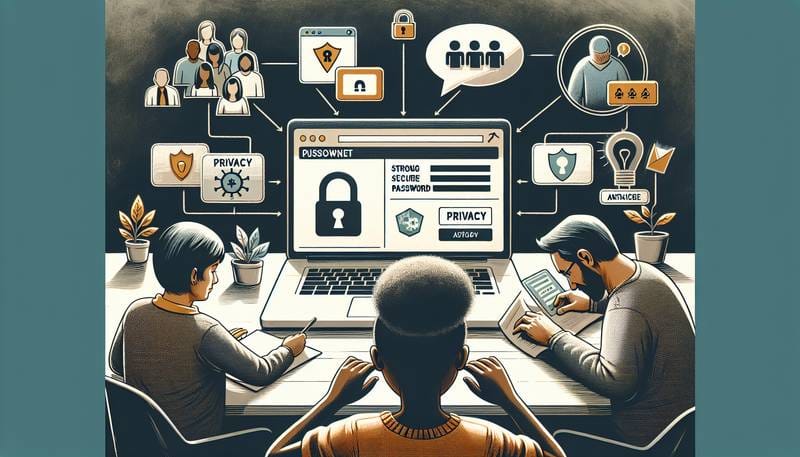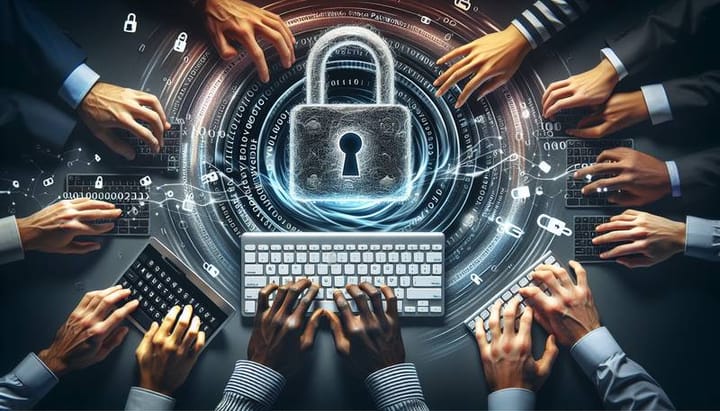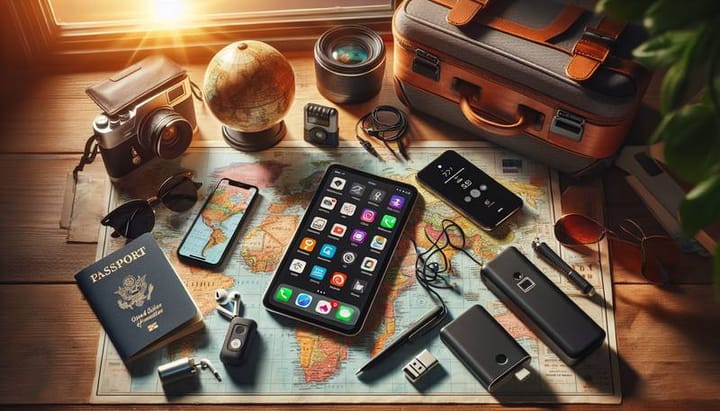Basic Internet Safety Tips Everyone Should Know

Introduction
Welcome to our comprehensive guide on essential internet safety tips that every web surfer should have up their sleeve. In this tech-driven age, the web is a sprawling metropolis of information highways, social gatherings, and digital marketplaces. But just like any bustling city, it has its unsavory parts that can pose risks to the unwary traveler. As we lead increasingly digital lives, our personal information becomes more exposed to cyber threats such as identity theft, scams, and hacking. But fear not, dear netizen, for we're here to arm you with the knowledge you need to navigate the online world with confidence and caution. So, sit back, relax, and let's embark on this journey toward a safer online experience, seasoned with a pinch of humor to keep things interesting!
The Password Game: Your First Line of Defense
Let's kick things off with the gatekeepers of your digital domains: passwords. A password is like the combination to a safe, so it's important to make it hard to crack. Saying "I'll just use my birthday" is like putting a neon sign above your safe saying "Rob me, please." Instead, practice crafting strong passwords by using a mix of uppercase letters, lowercase letters, numbers, and special characters. Avoid common words or phrases and steer clear of using the same password for multiple accounts. If memorizing a gazillion passwords sounds like a nightmare, consider using a password manager. These nifty tools create and store complex passwords for all your accounts securely, so you only need to remember one master password. And when it comes to security questions, treat them as extra password fields. Don't give answers that are easy to find or guess, like your mother's maiden name or your hometown. Instead, pick obscure facts or even use false answers that only you would remember.
Phishing - Don't Take the Bait: Spotting Online Scams
Imagine you're a fish swimming around the internet ocean, minding your own business, when suddenly you see an enticing worm on a hook. That worm is a phishing scam; that hook will reel in your personal information if you're not careful. Phishing attacks often come disguised as legitimate-looking emails, messages, or websites. Their goal is to trick you into giving up your passwords, credit card details, or Social Security number. To outsmart these cyber con artists, be skeptical of any communication asking for sensitive information, especially if it instills a sense of urgency or fear. Watch out for alarming subject lines like "Your account has been suspended!" or "Urgent action required!" Always check the sender's email address - if it looks suspicious or doesn't match the company's official domain, it's probably a phish in disguise. And whatever you do, never click on links or download attachments from unknown or untrusted sources. These could lead you to fraudulent websites or infect your device with malware. When in doubt, contact the company directly through verified means to ensure the request is legitimate.
Safe Browsing - Surf Smart: Steering Clear of Digital Hazards
As you catch the waves of the World Wide Web, remember that not all waters are safe. Being a smart surfer means recognizing the signs of dangerous territories and steering clear of them. Secure websites are those that use HTTPS in their address, indicated by a padlock icon beside the URL. This extra 'S' stands for ‘secure’, and it means the site encrypts the data you send and receive, keeping it safe from prying eyes. Think of it as a seal on an envelope; without it, anyone could read your letters. When browsing, also keep an eye out for a website's certificate information which can be accessed by clicking on the padlock icon. This will tell you if the website is who they claim to be. And just like with phishing, steer clear of clicking on pop-up ads or unexpected prompts that may lead to malware-ridden pages. Additionally, be mindful of the information you share online. Oversharing can lead to privacy issues, and once it's online, it's hard to take back. Use the incognito or private mode on your browser when you want to keep your activity under wraps, but bear in mind it doesn't make you invisible - your internet service provider can still track your moves.
Public Wi-Fi - Proceed with Caution: Navigating Wireless Networks Safely
Ah, public Wi-Fi, the digital watering hole where we quench our internet thirst on the go. But before you connect, be aware that public networks are like a town square - bustling and open to everyone, including potential cybercriminals. These networks are often not secure, meaning the data you transmit could be intercepted by someone else on the same network. So, how do you protect yourself? First, if you must use public Wi-Fi, avoid accessing sensitive accounts or conducting important transactions. Save those activities for a private, secure connection. Secondly, consider using a Virtual Private Network, or VPN, which creates a secure tunnel for your data, shielding it from snooping eyes on public networks. Confirm the network's legitimacy by asking an employee of the venue—for instance, at a coffee shop or hotel—about the correct network name and login procedures. Be wary of networks with overly generic or suspicious names like "Free_Public_WiFi" or "ClickHereForInternet." Those could be traps set by cybercriminals. Finally, after using public Wi-Fi, remember to forget the network on your device, so it doesn't automatically reconnect in the future without your knowledge.
Software Updates - Keep it Fresh: Embracing the Update Nudge
Imagine your internet security as a fortress. Even the most formidable castles need upkeep, or they'll crumble over time, and that's precisely what software updates are for your devices. We know, we know, it can be annoying when that update notification pops up just as you're about to beat the final boss or finish a work project. But postponing updates leaves you vulnerable to security exploits that hackers are all too eager to take advantage of. These updates patch holes in your security and introduce new features to keep cyber threats at bay. So, next time your device tells you it's time for an update, think of it as a fitness routine for your software to keep it in top form. Make it a habit to check for updates regularly, not just for your operating system but also for your apps and security software. By enabling automatic updates, you give yourself one less thing to worry about, ensuring that you're always running the latest, safest versions of your software. It's a simple action that can save you from a lot of potential digital headaches down the road.
Social Media Savvy: Curating Your Online Presence
Let's switch gears and talk about social media, the digital playground where we connect, share, and sometimes overshare. It's fantastic to stay in touch with friends and family, but it's important to keep your guard up. Your personal information is like currency in the digital world, and oversharing can inadvertently make you a target. Start by locking down your privacy settings. Most platforms offer detailed options to control who sees your posts, personal data, and even your list of friends. Keep track of these settings and review them regularly as platforms often update their privacy policies. Get into the habit of thinking twice before you share. That selfie with your new driver's license might garner a lot of likes, but it's also a gold mine for identity thieves. Lastly, be selective about your connections. It might feel great to have thousands of 'friends,' but if you wouldn't trust them with your house keys, should you really allow them into the virtual home of your personal life? And for an extra layer of security, consider regularly googling yourself to monitor what information about you is publicly accessible. This way, you can take steps to remove or secure any information you're not comfortable with others seeing.
Conclusion: Navigating the Cyber Seas with Confidence
And there we have it, fellow internet adventurers - an arsenal of essential internet safety tips to steer you clear of digital mishaps and mayhem. Let's do a quick recap: Create robust passwords and manage them well; stay vigilant against phishing hooks; know the signs of a secure website for safe browsing; exercise caution and use a VPN on public Wi-Fi; keep your software updated; share wisely on social media and keep a close eye on privacy settings. Remember, staying secure online isn't just about guarding against potential threats; it's about building good digital habits that become second nature. By applying these strategies, you're not just protecting your personal information - you're contributing to a safer internet community for everyone. So, go forth and explore the incredible expanse of the web with a renewed sense of security and savvy. Enjoy the journey, stay curious, and most of all, keep safe!


